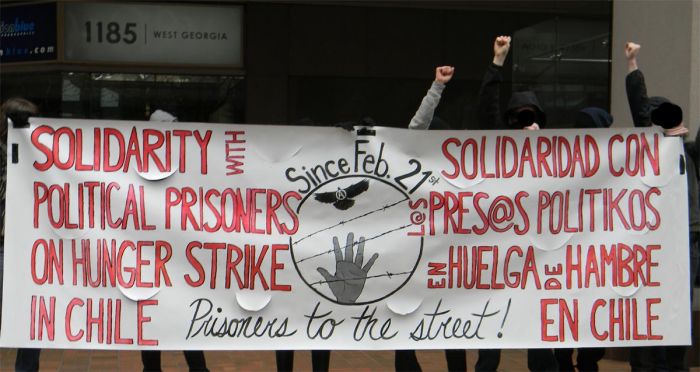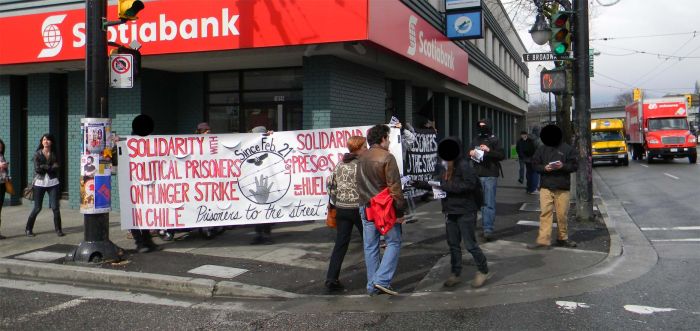From Milwaukee Indymedia
The night of March 15th, a group of roughly forty students, workers, the unemployed and other uncontrollables marched to the Milwaukee County Jail, carrying banners and black flags. The banners at the front of the march read “Burn All Prisons” and “No Control”. Upon arriving at the front doors of the jail, demonstrators chanted “Free them all” and launched dozens of fireworks through the air in an effort to communicate with those locked inside.
The demonstration was called for by participants in the occupation of the Theatre building at UW-Milwaukee as a part of the ongoing struggle against the “Budget Repair Bill”. The bill, proposed by the hated governor of Wisconsin, contains a provision that will institute a Truth-in-Sentencing policy. This measure removes the possibility for those locked away in Wisconsin’s jails and prisons to qualify for early release for good behavior or ‘good time’
For inmates this means a dramatic increase in the time spent in jail – more time in captivity, kept away from their families and loved ones, kept in abject misery and isolation. The Truth-in-Sentencing provisions of the bill highlight specifically how the economic attacks on working and unemployed people throughout the state goes hand in hand with the criminalization and imprisonment of the working class). The economic system that exploits our labor, deprives our benefits, and throws us on the street is the very same system that keeps us in cages and behind barbed wire.
In the past weeks of resistance to Walker’s austerity measures, the politicians and police unions have been remarkably silent about this provision. They’ve built a mythology that “we’re all in this together” or that “they’re on our side”. It is more convenient for them to simply ignore the ways that the bill they purportedly oppose dramatically expands the prison system they faithfully defend. It’s no coincidence that the bill both extends prison sentences while also protecting the Police Union from the elimination of collective bargaining rights. The role of politicians and the police is to maintain the dreadful economy and the prison system necessary to it. It should come as no surprise to us that those who fail to criticize this system are the same who encourage us to continue working and scold those who step outside the lines they’ve defined.
It is time for new lines to be drawn. On the one side: the governor, politicians, police, bureaucrats, professional activists. On the other: prisoners, workers, students, the unemployed, the enraged. If the spontaneous struggle against this bill were to generalize and become a movement against this economic system and its prisons, it would mean that those affected by the bill would need to extend their actions and gestures of solidarity through all the walls that separate them. December’s historic strike by prisoners in Georgia shows us what such action could look like. For us, this means that the strikes, occupations and sabotage – the generalized disruption of the economy – needs to spread through the walls of the prison, to generalize, and to intensify. In this, we need to build complicit relationships and revolt inside and outside those walls.
Towards an unlimited strike, for a world without prison.
 Makassar, Indonesia – An ATM of Bank Central Asia was attacked with firebombs at midnight March 25. Leaflets were left at the scene, stating:
Makassar, Indonesia – An ATM of Bank Central Asia was attacked with firebombs at midnight March 25. Leaflets were left at the scene, stating:




